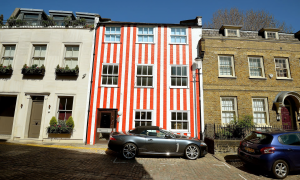Anus matronae parvae malas leges faciunt: Difference between revisions
Amwelladmin (talk | contribs) No edit summary |
Amwelladmin (talk | contribs) No edit summary |
||
| Line 1: | Line 1: | ||
[[File:Stripey House.png|thumb|right|when little old ladies make [[excellent]] law.]] [[Anus matronae parvae malas leges faciunt]] is a {{tag|Latin}} maxim I made up, with a ''lot'' of help from my excellent [[secret Latin Advisor]]. It means “''little old ladies make bad law''”. | |||
For every good example of this (There is of course [[Greenclose]], and one could argue the entire modern history of [[constructive trust]]s), there are examples where little old ladies make ''excellent'' law, as in the case of the stubborn old lady called who, when refused planning permission for a basement, painted her house stripey in protest. Officious pedants at the council tried to order her to repaint it white, and while they were supported by lower level functionaries in district tribunals, but the Queen’s Bench Division was having ''none'' of it. | |||
{{casenote|Lisle-Mainwaring|Royal Borough of Kensington and Chelsea}} | |||
===See=== | ===See=== | ||
Revision as of 13:27, 25 April 2017

Anus matronae parvae malas leges faciunt is a Latin maxim I made up, with a lot of help from my excellent secret Latin Advisor. It means “little old ladies make bad law”.
For every good example of this (There is of course Greenclose, and one could argue the entire modern history of constructive trusts), there are examples where little old ladies make excellent law, as in the case of the stubborn old lady called who, when refused planning permission for a basement, painted her house stripey in protest. Officious pedants at the council tried to order her to repaint it white, and while they were supported by lower level functionaries in district tribunals, but the Queen’s Bench Division was having none of it.
Lisle-Mainwaring v Royal Borough of Kensington and Chelsea